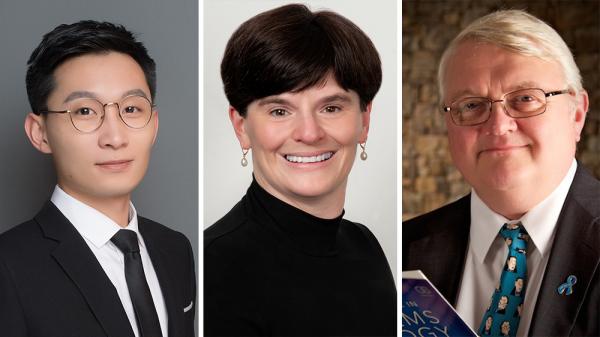Sigma Xi has recognized the research of two faculty members and a Ph.D. student in the Wallace H. Coulter Department of Biomedical Engineering as some the most noteworthy on campus. All three use computational tools to improve our understanding of biological systems and better care for patients.
Eberhard Voit received the Sustained Research Award for 2021, the highest tribute from the honor society of scientists and engineers at the Georgia Institute of Technology, considered a “lifetime” award for outstanding work across the scope of the winner’s career. Cassie Mitchell won the Young Faculty Award, which goes to early career professors making a mark in their fields. Sigma Xi also gave a Best Ph.D. Thesis Award to Minliang Liu, a mechanical engineering student who was advised by Coulter Department Associate Professor Wei Sun.
Voit said the award was humbling and gratifying, given the level of accomplishments across Georgia Tech. He works to use mathematics and computational tools to gain insights into biological systems from the molecular level up to entire environments — a concept that was barely recognized when he entered college.
“When I graduated with double master’s degrees in biology and math, a professor told me, ‘Biology is too complicated to use math.’ By now, we have come to realize that biology is too complicated not to use math,” said Voit, David D. Flanagan Chair and Georgia Research Alliance Eminent Scholar in Systems Biology. “The only hope we have to understand the structure, features, and roles of complex systems in biology, medicine, and the environment is through mathematics and computation, because our brains are simply not equipped to deal with even dozens, let alone hundreds of simultaneous processes and their numerical implementations. We are still far from such an understanding, but pioneers of systems biology, on whose shoulders I am standing, have started to blaze a trail in the right direction.”
Voit said his early career was a series of wide-ranging apprenticeships, since the field of systems biology didn’t exist yet. He explored zoology, microbiology and immunology, forestry, environmental risk assessment, and other areas, he said, “acquiring many different viewpoints as well as numerous distinct approaches to solving complicated problems. The amalgamation of these has made me who I am.”
Now he calls himself a “missionary for the field” of systems biology, writing two books designed for interested non-experts: The Inner Workings of Life and Systems Biology: A Very Short Introduction.
Mitchell, an assistant professor whose work focuses on developing computational techniques for predictive medicine, said winning the Young Faculty Award the same year as Voit’s Sustained Research Award has made the honor particularly special.
“My early career as a Ph.D. student at Georgia Tech was inspired by the pioneering biomedical computational modeling of Dr. Voit, and though we are now colleagues, his research success continues to inspire me,” Mitchell said. “Dr. Voit and I simultaneously winning these prestigious Georgia Tech Sigma Xi Awards shows the newfound growth, translational impact, and overall perceived value of computational biomedical engineering research.”
Mitchell’s research weighs the complex factors that underpin disease dynamics to better predict disease progression and treatment for individual patients. It’s work that stems, in part, from her own experiences as a patient.
“What I love about my research in predictive medicine is that it expedites every facet of healthcare — disease causes, new cures, and optimal patient care,” Mitchell said. “As a patient myself with quadriplegia and cancer, I understand the value of balanced research that solves both immediate and personalized aspects of quality of life while striving for radical discoveries to eradicate disease entirely.”
Mitchell said she also loves making those discoveries with her large group of students — about three dozen undergraduates and high school interns alongside eight to 10 graduate students — and helping them grow and succeed.
“I feel very humbled and honored to receive this prestigious Young Faculty Award from Sigma Xi at Georgia Tech,” she said.
Computational tools also were at the heart of Minliang Liu’s Best Ph.D Thesis Award-winning research. Liu developed noninvasive methods to assess patients’ risk of an aortic aneurysm rupture based on medical images. Liu’s computational framework used inverse methods and machine learning alongside probabilistic models to calculate patient-specific material properties and aneurysm rupture risk in vivo.
“Aortic aneurysm is a significant cause of death globally. With the advancement of clinical cardiac imaging modalities and computational tools, patient-specific biomechanical evaluation of aneurysm dissection and rupture is getting closer to reality,” Liu said. “My thesis research offers great potential for personalized diagnosis and risk assessment, and it provides insights into the clinical decision-making process, which can ultimately improve clinical outcomes for aneurysm patients.”
Liu was co-advised by Sun and H. Jerry Qi, professor in the George W. Woodruff School of Mechanical Engineering. He continues to work in Sun’s lab as a postdoctoral fellow. Liu’s thesis is one of only 10 across Tech’s campus that Sigma Xi recognized for their merit.
Liu, Mitchell, and Voit will accept their awards later in the spring at a virtual ceremony for all the Sigma Xi winners.
Media Contact
Communications Manager
Wallace H. Coulter Department of Biomedical Engineering
Keywords
Latest BME News
Jo honored for his impact on science and mentorship
The department rises to the top in biomedical engineering programs for undergraduate education.
Commercialization program in Coulter BME announces project teams who will receive support to get their research to market.
Courses in the Wallace H. Coulter Department of Biomedical Engineering are being reformatted to incorporate AI and machine learning so students are prepared for a data-driven biotech sector.
Influenced by her mother's journey in engineering, Sriya Surapaneni hopes to inspire other young women in the field.
Coulter BME Professor Earns Tenure, Eyes Future of Innovation in Health and Medicine
The grant will fund the development of cutting-edge technology that could detect colorectal cancer through a simple breath test
The surgical support device landed Coulter BME its 4th consecutive win for the College of Engineering competition.








